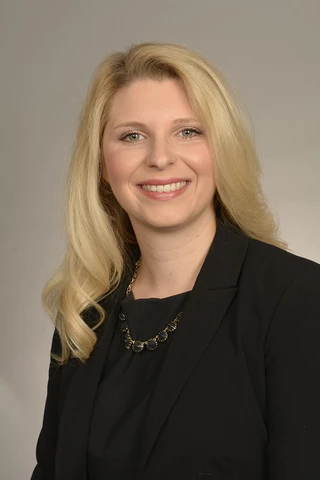 Name: Elizabeth Rowland
Name: Elizabeth Rowland
Title: Executive Director, NASDA Foundation
What is your background and how did you find your way into the ag industry?
I grew up in South Georgia where agriculture was an important part of my childhood. Many memories I have are of my family and extended relatives coming together on harvest day, or my grandmothers canning everything from tomatoes and pickles to jams. I received my BS in Agriculture Communications and MS in Agricultural Leadership, Communication, and Education from the University of Georgia. During college I completed a fellowship on the hill for a Georgia congressman who served as the vice chair of the subcommittee on Ag Appropriations and worked on the 2007 Farm Bill. I spent several years in the classroom teaching agriculture education, and most of my career has been in nonprofit management for The National Association of State Departments of Agriculture.
Why is diversity important to you and your organization?
Diversity is important to me because it builds knowledge and gives you better experience and access to other ideas and ways of accomplishing goals. Allowing everyone to have a seat at the table enables us to be better people in our community and in the workplace. NASDA understands the importance of diversity and the impact it has on agriculture, which is why the membership developed a DEI policy.
What current diversity initiatives do you have planned or ongoing?
We started lunch-and-learns every quarter to discuss a topic on diversity that the agriculture industry is facing. These lunch-and-learns are open to anyone interested in attending. We are also looking to partner with other agricultural groups who are advancing their diversity to expand our resources and outreach. We currently have an MOU with MANRRS called the Agricultural Policy Summit where students come to our Winter Policy Conference to learn about agricultural policy and careers in public service. The NASDA Foundation recently partnered with USDA-AMS through a cooperative agreement that provides education and outreach, specifically focusing on group GAP and socially disadvantaged and underserved growers and producers. NASDA and the Foundation’s first question is how we can incorporate diversity into policy, programs, and partnerships moving forward.
In your opinion, what is the most exciting thing happening in the industry currently?
The most exciting thing in the industry now is watching action being taken around diversity. The pandemic has highlighted the importance of partnerships in promoting more communications across other industries to create a movement of change.
What is your vision for the future of agriculture?
My vision for the future of agriculture is one where all people appreciate and develop a better understanding of where our food comes from. Understanding the struggles growers, producers, and ranchers face to provide food on the shelves for our country.
Is there anything else you would like people to know about your organization or the agricultural industry?
NASDA is a nonprofit, nonpartisan organization that represents commissioners, directors, and secretaries of all 50 state departments of agriculture and four territories through policy, partnerships, and public engagement. The NASDA Foundation is the only foundation that supports all 50 state departments of agriculture and four territories through education, outreach, and research.
About Together We Grow
Together We Grow is an agribusiness consortium with members that include major agricultural commodities companies, educational institutions, government agencies, and others committed to improving and expanding diversity in agribusiness. The consortium sponsors research and provides a platform to share best practices for building future workforce capacity; it will have its permanent home at the Spur Hydro building. For more information, visit twg.csusystem.edu.
About Spur: CSU System at the National Western Center
Coming in 2022: CSU System will open Spur, where innovative ideas and unforgettable experiences come to life at the National Western Center. Spur’s three buildings at the center of the landmark project in north Denver will ignite and fuel new ideas around water, food, and health and their impact on our lives and our world. Spur is where learning is open and accessible to all. Where researchers tackle the world’s most pressing problems around water, food, and health. Where art and culture challenge and surround you. Where rural and urban, local and global intersect. Learn more at csuspur.org.